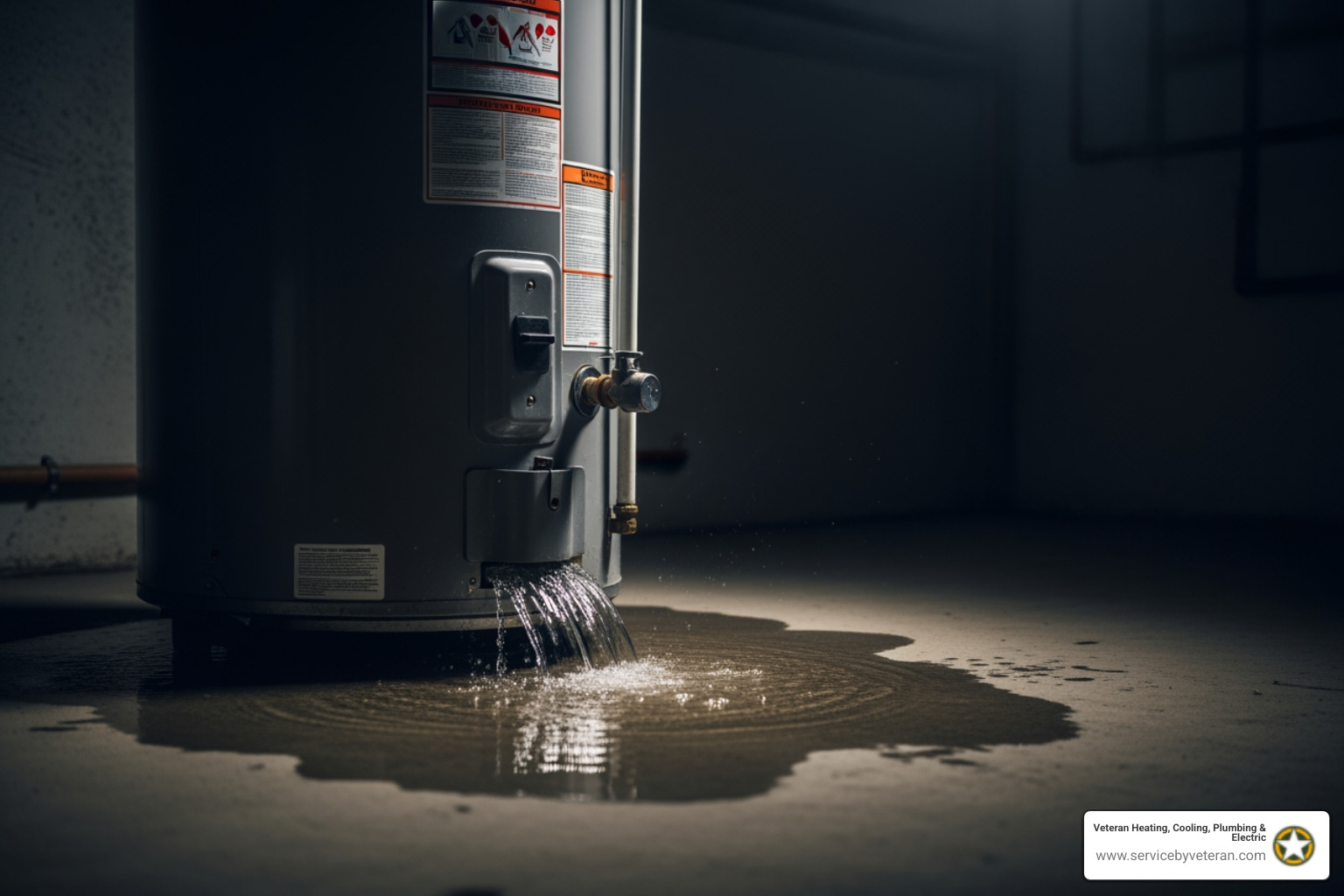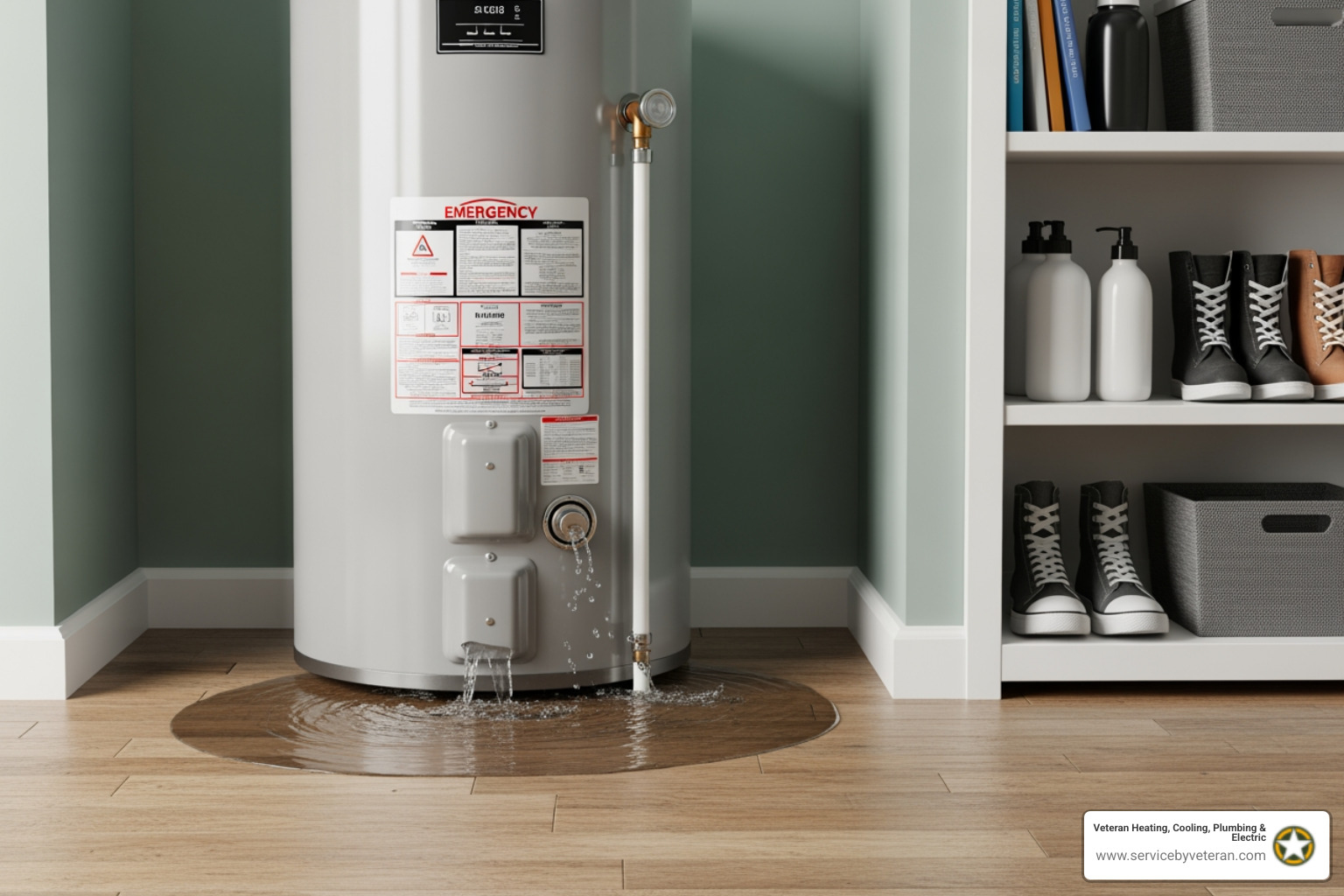Why Choosing the Right Plumbing Contractor Matters
When your home needs major plumbing work, finding the right plumbing contractor can mean the difference between a smooth project and costly headaches. Here's what you need to know:
Quick Answer: What is a Plumbing Contractor?
- Scope: Handles large-scale projects like new construction, remodeling, and system installations
- Licensing: Requires higher-level certifications than general plumbers
- Services: Water main connections, sewer lines, gas installations, and code compliance
- Projects: New construction, major renovations, commercial work, and complex repairs
- Payment: Typically requires upfront deposits and provides detailed project bids
Unlike a regular plumber who fixes leaky faucets and unclogged drains, a plumbing contractor manages complex installations and major projects. They handle everything from designing new plumbing systems to ensuring your project meets all building codes and regulations.
The plumbing industry is the second-highest earning trade with a mean annual wage of $58,360, and contractors must meet strict licensing requirements. In Washington State, for example, plumbing contractors need a $6,000 surety bond and $250,000 in liability insurance just to operate legally.
Why does this matter to you? Major plumbing projects involve your home's structural systems, local building codes, and significant financial investment. The wrong choice can lead to code violations, expensive repairs, and safety issues down the road.
I'm Mike Townsend, and my military background managing precision cooling systems for heat-seeking missiles taught me that technical expertise and attention to detail are non-negotiable when working with complex systems. As a veteran business leader in the trades, I've seen how the right plumbing contractor can transform a stressful project into a seamless experience.
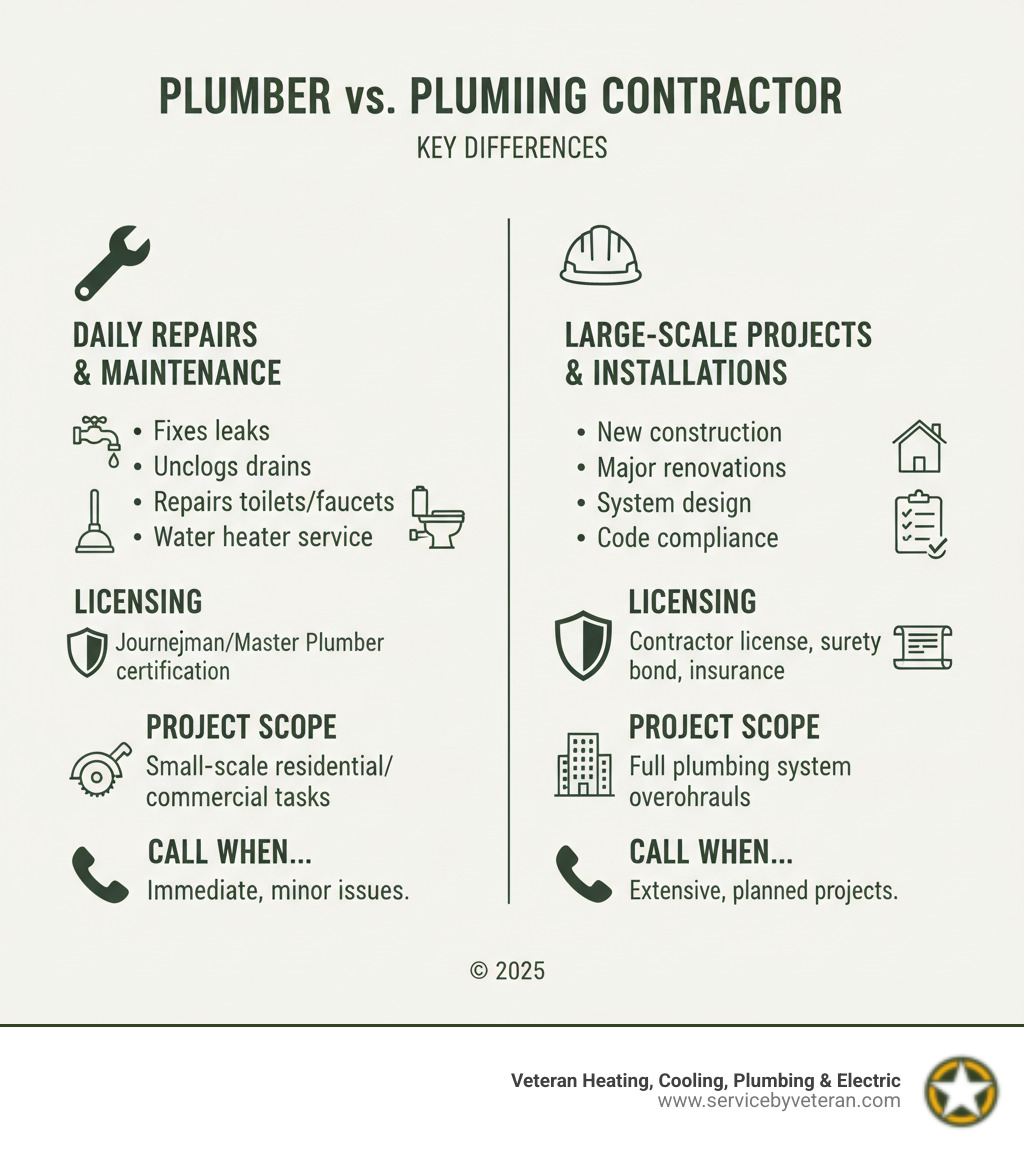
Plumber vs. Plumbing Contractor: Understanding the Key Differences
Here's something that surprises many homeowners: plumber and plumbing contractor aren't just two ways to say the same thing. While both work with pipes and water systems, they handle completely different types of projects.
Think of it like this - a plumber is your family doctor for everyday plumbing problems, while a plumbing contractor is the specialist surgeon who handles major operations. Getting this right can save you time, money, and a lot of frustration.
Let's break down when you need each one:
What is a Plumber?
A plumber is your go-to person for those "honey-do" list items and unexpected plumbing emergencies. These skilled professionals have spent years learning their craft through apprenticeships and hands-on training.
Your plumber handles the daily stuff - those annoying leaky faucets that keep you up at night, clogged drains that back up at the worst possible moment, and toilet repairs when things just won't flush right. They're also great for fixture installation when you want to upgrade that old sink or install a new shower head.
When your water heater starts making strange noises at 2 AM, or a pipe bursts during a cold snap, plumbers provide those crucial emergency services that get your home back to normal fast.
Most plumbers work within your existing plumbing system. They're problem-solvers who can quickly diagnose what's wrong and fix it efficiently. More info about our plumbing repair services.
What is a Plumbing Contractor?
A plumbing contractor takes on the big picture stuff. While they can certainly fix a leaky faucet, their real expertise shines on major projects that involve planning, permits, and complex installations.
New construction is where plumbing contractors really show their value. They work from blueprints to design entire water and waste systems for homes and buildings. During major renovations, they figure out how to reroute pipes when you're knocking down walls or adding a new bathroom.
Some of their specialized work includes water main installation (connecting your home to the city water supply), sewer line projects (the big pipes that carry waste away from your property), and gas line installation for stoves, dryers, and heating systems.
But here's what really sets them apart - project management and subcontractor coordination. A plumbing contractor doesn't just install pipes; they manage timelines, work with other trades like electricians and carpenters, and make sure everything meets local building codes.
They're the ones who think about water pressure throughout your entire house, plan for future needs, and ensure your plumbing system will work reliably for decades. More info about our installation services.
The Expanded Role of a Plumbing Contractor
A plumbing contractor does much more than fix pipes. They're the architects behind your home's entire water and waste system, combining technical expertise with project management skills that regular plumbers simply don't need for everyday repairs.
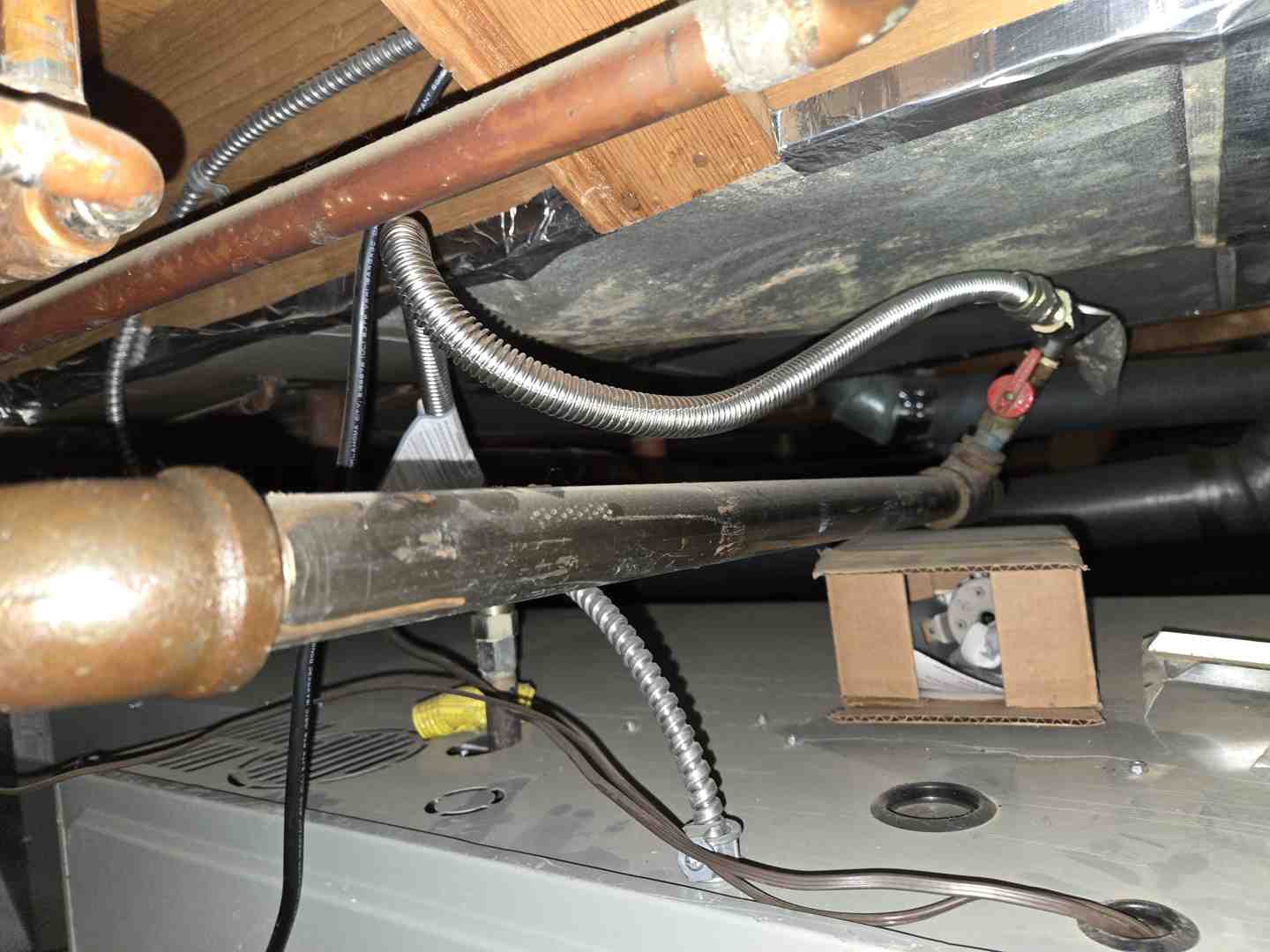
Think about it this way: when you build a new home or gut a kitchen, someone needs to understand building codes, read blueprints, calculate water pressure systems, and design waste disposal systems that will work flawlessly for decades. That someone is a plumbing contractor.
These professionals must also ensure compliance with regulations like the American with Disabilities Act (ADA) for commercial properties. It's not just about connecting pipes - it's about creating systems that meet legal requirements while serving your specific needs.
From my experience managing complex cooling systems in the military, I know that system design requires both technical knowledge and the ability to see the big picture. A plumbing contractor brings this same level of precision to your home's infrastructure.
Services Beyond Standard Repairs
While your neighborhood plumber excels at fixing what's broken, a plumbing contractor builds and transforms entire systems from the ground up.
Main water line connection is one of their most critical services. This isn't just hooking up a pipe - it's ensuring your property has the right-sized connection to handle your home's water demands, whether you're running multiple showers or filling a large soaking tub.
For homes not connected to city sewer systems, septic system design becomes essential. A plumbing contractor doesn't just dig a hole and drop in a tank. They analyze soil conditions, calculate capacity needs, and ensure the entire system meets environmental regulations.
Backflow prevention installation might sound technical, but it's simply protecting your drinking water from contamination. This is especially important for businesses like restaurants or medical facilities, where public health is at stake.
Water conditioning systems are another specialty area. Whether you need a whole-house water softener or a complex filtration system, a plumbing contractor ensures it integrates seamlessly with your existing plumbing.
Gas control valves and line installation require specialized training and licensing. These professionals safely connect gas lines to your water heater, furnace, or kitchen range, following strict safety codes that protect your family.
For more information about drain-related services that sometimes involve these larger system issues, you can learn more here: More info about drain services.
Typical Projects That Require a Plumbing Contractor
Knowing when to call a plumbing contractor instead of a regular plumber can save you time, money, and headaches. The key is project scope - if it involves major changes to your plumbing infrastructure, you need a contractor.
Full home repiping tops the list. This massive undertaking involves replacing every water supply and drainage pipe in your house. It requires careful planning to minimize disruption and ensure the new system works better than the old one.
Kitchen or bathroom remodels often need a plumbing contractor, especially when you're moving fixtures or adding new ones. Moving a kitchen island with a sink, for example, means running new water and drain lines through floors and walls.
New home construction obviously requires a plumbing contractor from day one. They design the entire system, coordinate with other trades, and ensure everything works together perfectly.
Commercial building fit-outs present unique challenges. A restaurant needs grease traps, a medical office needs specialized sinks, and an office building needs water fountains and restrooms that comply with accessibility requirements.
Additions requiring new plumbing lines can be tricky. The contractor must figure out how to extend your existing system without compromising water pressure or drainage capacity in the rest of your home.
New Construction vs. Remodeling Projects
The role of a plumbing contractor varies depending on whether they're working on new construction or remodeling, though both require their specialized skills.
In new construction, everything starts from scratch. During the rough-in plumbing phase, the contractor installs all the pipes, vents, and gas lines before the walls get closed up. This is make-or-break time - mistakes here become expensive nightmares later.
The finish plumbing phase comes after the walls are painted and floors are installed. This is when you see the visible results: toilets, sinks, faucets, and all the fixtures that make your house feel like home.
Remodeling projects present different challenges. Integrating new pipes with old systems requires detective work - figuring out what's behind the walls and how to connect new components without disrupting the rest of your home.
Upgrading outdated plumbing often becomes necessary during remodels. Those old galvanized pipes might have served your grandparents well, but modern PEX or copper pipes perform better and last longer.
Most importantly, a plumbing contractor ensures system-wide integrity. Adding a new bathroom upstairs might seem straightforward, but it could overload your existing water heater or create drainage problems if not planned properly.
The difference between a successful project and a costly mistake often comes down to this level of system thinking that only experienced plumbing contractors provide.
How to Hire the Right Plumbing Contractor
Finding the right plumbing contractor for your project shouldn't feel like rolling the dice. When you're investing thousands of dollars in your home's plumbing infrastructure, you want someone who'll do the job right the first time. The wrong choice can lead to costly repairs, code violations, and months of headaches.

Think of hiring a plumbing contractor like choosing a surgeon for a major operation. You wouldn't pick someone based on the lowest price alone. You'd want to see their credentials, hear about their experience, and feel confident they know what they're doing.
The good news? You don't need to be a plumbing expert to make a smart choice. Focus on three key areas: proper licensing and insurance, solid reputation and experience, and clear understanding of legal requirements. Get these right, and you're well on your way to a successful project.
Licensing, Insurance, and Bonding
This is where many homeowners get tripped up, but it's absolutely critical. A plumbing contractor's license isn't just a piece of paper—it's proof they've met rigorous standards and know how to work safely within building codes.
State licensing requirements vary, but they're always more demanding than what regular plumbers need. In Washington State, for example, plumbing contractors must be licensed with the Department of Labor & Industries and register their business with the Department of Revenue. The Washington State licensing requirements spell out exactly what's needed to operate legally.
The path to becoming a licensed plumbing contractor is no joke. Most start as Journeyman plumbers after completing a four to five-year apprenticeship program. Then they advance to Master Plumber status by passing comprehensive exams. Finally, they earn their contractor's license by demonstrating business knowledge and legal understanding. You can learn more about this progression at Information on contractor skills.
General liability insurance protects you if something goes wrong during the project. What if the contractor accidentally damages your hardwood floors or causes a flood? Without proper insurance, you could be stuck with the bill. In Washington, plumbing contractors must carry at least $250,000 in liability coverage.
Surety bonds add another layer of protection. If your plumbing contractor abandons the job or fails to meet contract terms, the bond provides financial recourse. Washington requires a $6,000 surety bond for good reason—it shows the contractor is serious about their commitments.
Always verify these credentials before signing any contract. A legitimate plumbing contractor will gladly provide proof of licensing, insurance, and bonding.
Experience, Reputation, and References
Once you've confirmed the legal basics, it's time to dig into what really matters: can this plumbing contractor deliver quality work on time and within budget?
Years in business tell a story. A contractor who's been around for decades has weathered economic ups and downs, solved countless problems, and built a sustainable business model. They're not likely to disappear halfway through your project.
Ask to see a portfolio of past projects, especially ones similar to yours. If you're remodeling a kitchen, you want to see their kitchen work. Planning a bathroom addition? Look for examples of their bathroom installations. Quality contractors take pride in their work and love showing it off.
Online reviews provide real insights from actual customers. Check Google, social media, and local review sites. Look for patterns in the feedback. Do customers consistently praise their punctuality? Do they mention clean work sites? How does the contractor respond to complaints?
Don't overlook industry reputation either. A plumbing contractor who's respected by other trades, suppliers, and local building officials has earned that standing through consistent professionalism.
Ask for references and actually call them. Recent customers can tell you about communication style, problem-solving abilities, and whether the contractor cleaned up after themselves. Most people are happy to share their experiences, good or bad.
At Veteran Heating, Cooling, Plumbing & Electric, we've built our reputation on delivering honest, community-focused service throughout Denver, Lakewood, Littleton, and surrounding areas. Our lifetime warranty on parts and labor and money-back guarantee reflect our confidence in our team's expertise. Check out our latest blog posts to see how we approach different projects and challenges.
Understanding Legal and Regulatory Aspects
Here's where a professional plumbing contractor really earns their fee. The maze of permits, inspections, and building codes can overwhelm even experienced homeowners, but it's second nature to qualified contractors.
Permits are required for most major plumbing work, and obtaining them is typically the contractor's responsibility. They know exactly which permits are needed, how to apply for them, and what information inspectors will want to see. Trying to steer this yourself can delay your project by weeks.
Inspections happen at various stages of larger projects. Your plumbing contractor schedules these inspections, ensures the work is ready for review, and addresses any issues inspectors identify. They stake their reputation on passing these inspections the first time.
Local building codes are constantly evolving, and they vary between municipalities. What's acceptable in Denver might not fly in Castle Rock. Professional plumbing contractors stay current with these changes and understand how they apply to your specific project. They also ensure compliance with federal regulations, including ADA requirements for commercial work.
Understanding contractor versus general contractor laws matters too. A plumbing contractor is a specialty contractor focused solely on plumbing systems. General contractors oversee entire construction projects and hire specialists like plumbing contractors for specific work. If you're doing a major renovation, your general contractor might hire the plumbing contractor as a subcontractor. For plumbing-only projects, you'll work directly with the plumbing contractor. Washington's general contractor laws outline these relationships clearly.
A skilled plumbing contractor handles all these regulatory aspects seamlessly, protecting you from fines, failed inspections, and safety hazards. That's expertise you simply can't get from an unlicensed handyman or DIY approach.
Frequently Asked Questions about Plumbing Contractors
Over the years, we've helped countless homeowners steer plumbing contractors. These are the questions that come up most often in our conversations - and honestly, they're all great questions that show you're thinking like a smart homeowner.
How is a plumbing contractor different from a general contractor?
Think of it this way: if your home renovation were a symphony, the general contractor would be the conductor, and the plumbing contractor would be the virtuoso violinist. Both are essential, but they play very different roles.
A plumbing contractor is laser-focused on one thing: plumbing systems. They eat, sleep, and breathe water lines, drainage systems, gas connections, and everything that flows through your home. Their expertise runs deep in water supply systems, waste disposal, gas line installation, and the maze of codes that govern all of this work.
The general contractor, meanwhile, is the project manager extraordinaire. They're juggling budgets, timelines, permits, and coordinating everyone from electricians to carpenters to - you guessed it - plumbing contractors. While they understand construction broadly, they typically don't swing wrenches on specialized systems themselves.
So when you're planning a major renovation, your general contractor hires the plumbing contractor to handle the water and waste systems while they manage the big picture. It's teamwork at its finest, with each professional bringing their specialized expertise to your project.
What should I expect to pay a plumbing contractor?
Here's where things get interesting - and where plumbing contractors operate quite differently from the plumber you might call for a leaky faucet. Instead of charging by the hour for quick fixes, a plumbing contractor looks at your entire project and provides a comprehensive bid that covers everything from materials to permits.
The pricing structure reflects the complexity of what they do. New construction projects, major renovations, and system installations require careful planning, specialized materials, and often multiple site visits. Your plumbing contractor will factor in labor costs, materials, permit fees, and any coordination with other trades.
Most plumbing contractors require a deposit before starting work - typically around half the project cost. This isn't unusual; it helps them purchase materials and shows you're committed to the project. The remaining balance is usually due upon completion, though larger projects might have milestone payments tied to specific phases.
We always believe in transparent pricing. When we provide an estimate, everything is spelled out clearly so there are no surprises. The plumbing trade has a strong earning potential - with mean wages around $58,360 annually - but remember, your project cost includes much more than just labor. You're paying for expertise, materials, equipment, and the peace of mind that comes with professional installation.
How can I verify a plumbing contractor's license?
This is one of the smartest questions you can ask, and it's surprisingly easy to get the answer. Every state maintains online databases where you can look up contractor licenses - think of it as a report card that's always available.
The process is straightforward: ask your plumbing contractor for their license number, then head to your state's licensing website. In Washington State, you'd check with the Department of Labor & Industries (L&I). Here in Colorado, you'd typically look through the Colorado Department of Regulatory Agencies (DORA) or your local city or county licensing boards, since plumbing licenses can be issued at different levels.
What should you look for? You want to see an active license in good standing, with no recent disciplinary actions. The database will show you what type of license they hold, when it expires, and any complaints or violations on record.
Don't feel awkward about doing this research - any legitimate plumbing contractor expects and respects clients who do their homework. In fact, if someone gets defensive about providing their license number, that's a red flag worth paying attention to.
This simple verification step takes just a few minutes but can save you from costly mistakes, code violations, and the headache of dealing with unlicensed contractors. Trust me, it's worth the effort.
Your Partner for Complex Plumbing Projects
When you're planning a major home renovation or building from scratch, choosing the right plumbing contractor isn't just about finding someone who can connect pipes. You're selecting a partner who will help bring your vision to life while ensuring everything works flawlessly for years to come.
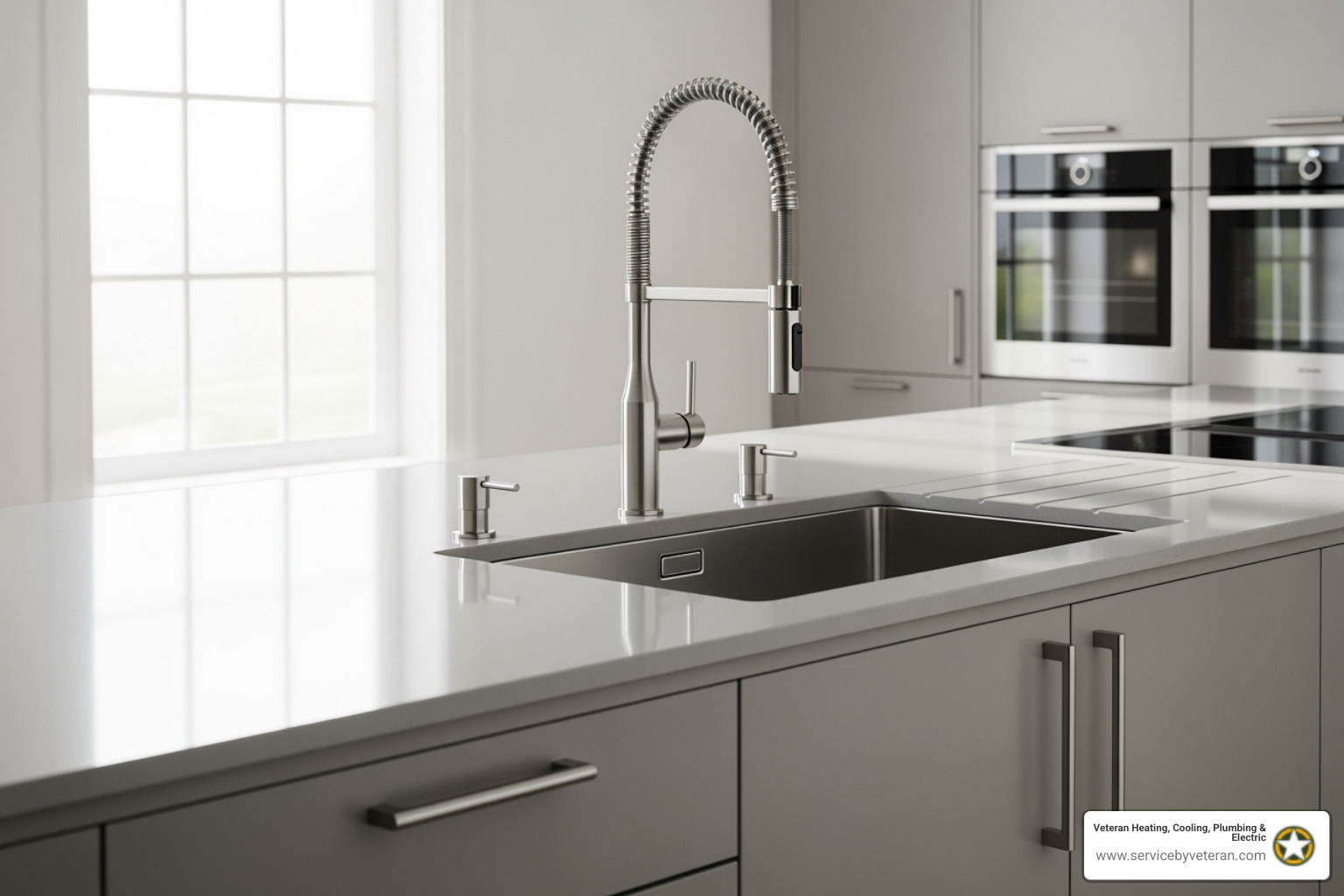
Think about it this way: your plumbing system is the circulatory system of your home. When it's done right, you don't think about it – everything just works. But when corners are cut or mistakes are made, those problems can haunt you for decades. That's why project success starts with choosing professionals who understand that this isn't just about today's installation, but about your long-term value and peace of mind.
At Veteran Heating, Cooling, Plumbing & Electric, we approach every project with the same attention to detail and commitment to excellence that defined our military service. As a veteran-led, locally owned company, we understand that your home is your most important investment. That's why we back every job with our lifetime warranty on parts and labor, plus our money-back guarantee.
Our professional installation process means you get systems designed to last, built to code, and installed with precision. Whether you're adding a new bathroom, repiping your entire home, or building your dream kitchen, we handle the complex planning and execution so you can focus on the exciting parts of your project.
We've been serving families across Denver, Lakewood, Littleton, Wheat Ridge, Aurora, Westminster, Arvada, and Castle Rock because we believe in taking care of our neighbors. When you work with us, you're not just getting a contractor – you're getting a local team that stands behind our work and cares about your family's comfort and safety.
Ready to discuss your project? We'd love to hear about your plans and show you how the right plumbing contractor can make all the difference. Contact Us to get started, or explore our comprehensive services to see how we can help bring your vision to life with the reliability and expertise you deserve.

